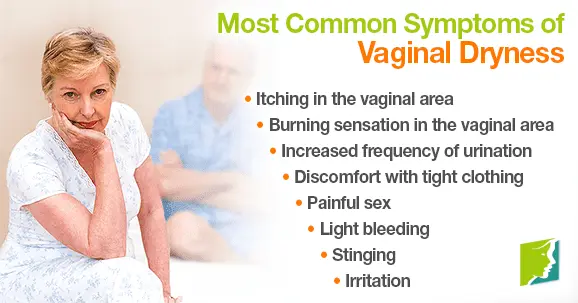Contents
Vaginal dryness, a common symptom in women
Vaginal dryness can affect all women, but is most common after menopause. The pain, itching, irritation or even infections that they cause can be treated, in particular by taking estrogen.
Description
When the tissues of the vagina are not sufficiently lubricated, it is called vaginal dryness or intimate dryness. This condition is common and is likely to affect all women (especially women after menopause).
It makes people more vulnerable to gynecological infections, disrupts the harmony of the couple (in particular by altering the libido) and can have significant psychological effects.
You can recognize vaginal dryness by these different symptoms:
- pain localized in the vagina;
- redness in the external genitalia;
- itching or even a burning sensation;
- irritation;
- pain during sexual intercourse (we speak of dyspareunia), and with that a drop in libido;
- burning during urination;
- slight bleeding after intercourse;
- or alternatively urinary tract infections and vaginal infections such as vaginitis.
Remember that normally, the vagina is lubricated. Its internal surface is lined with a mucous membrane and glands that allow the secretion of lubricating substances. At the level of the cervix, these glands secrete a viscous liquid, which flows along the wall and carries with it dead skin and germs. Good lubrication makes sex more comfortable.
The causes: menopause, but not only.
It is estrogens (female sex hormones, secreted mainly by the ovaries) that help maintain lubrication of the tissues of the vagina. When their levels drop, the vaginal tissue narrows, its walls thin and this causes vaginal dryness.
Estrogen levels decrease after menopause, which is why vaginal dryness is common in women at this time of their life. But other elements or situations can also cause a drop in female sex hormones. These include:
- certain medicines used in the treatment of breast cancer,endometriosis, fibroids or infertility;
- ovarian surgery;
- chemotherapy;
- severe stress;
- a vaginitis atrophique ;
- depression ;
- intensive exercise;
- taking drugs or alcohol;
- or the use of inappropriate soaps, laundry detergents, lotions or perfumes.
Vaginal dryness can also occur after childbirth or while breastfeeding, as estrogen levels may drop during these times.
Evolution and possible complications
If vaginal dryness is not managed:
- it can cause more severe pain during sex;
- affect the relationship with the partner. Initially the solution can be the use of a lubricating gel. ;
- accentuate the psychological burden it already causes;
- cause more frequent infections in the vagina.
Note that tampons or condoms can cause or worsen vaginal dryness.
Treatment and prevention: what solutions?
It is a doctor who will be able to establish a precise diagnosis and consequently propose an adapted treatment. So, to treat vaginal dryness, he may offer:
- hormonal treatment, namely taking estrogen (directly in the vagina, orally or via patches);
- the use of lubricants or vaginal moisturizers, mild cleanser;
- of hyaluronic acid ova (which will allow healing of the mucous membrane).
- avoid scented soaps or other lotions;
- avoid douching;
- prolong the preliminaries to optimize the natural lubrication;
- avoid excessive consumption of alcohol and drugs.
It is also advisable to take care of your personal hygiene to avoid vaginal dryness.










